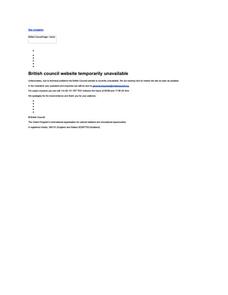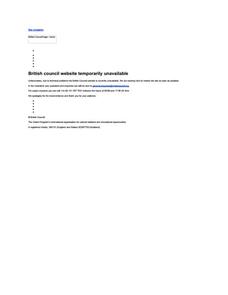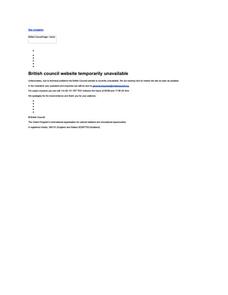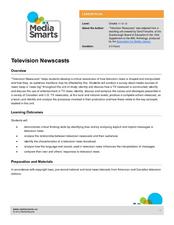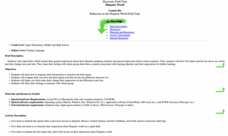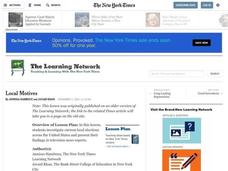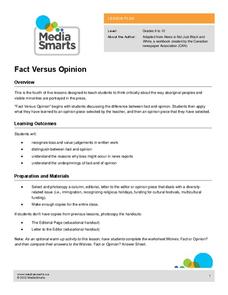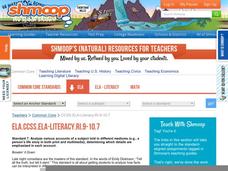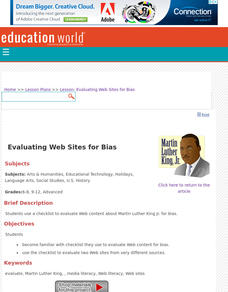Curated OER
Loose Lips
Have your middle and high schoolers analyze instances of celebrities using racial slurs or making prejudiced comments in public. After reading an article, they consider the roots and effects of prejudice and bias. As a class, they...
University of North Carolina
Psychology
Psychology, the scientific study of the human mind and behavior, is a popular major for many college students. An informative handout outlines common assignments in psychology courses. Scholars see how to design a research proposal,...
Curated OER
Simple Texts for Primary Pupils
Can literacy get any more fun than this? Learners not only have fun, but gain confidence as well when presented with familiar text in another language. Select books, songs, poems, even recipes written in another language, and using the...
Curated OER
Teaching Numbers with Primary Pupils
One, two, three. Un, deux, trois. Eins, zwei, drei. Primary learners love to count and this lesson contains a series of games that encourage learners to count in English, French, German, and Spanish. The exercises develop literacy and...
Curated OER
Memory Games
Researchers say that we need to hear and see new language 12 times before we remember it! Here's a plan that details a series of games that can be used as memory exercises. Bingo, Noughts and Crosses, Pelmanism, and repetitive speaking...
Ontario
Critical Literacy—Media Texts
Media texts convey both overt and implied messages. As part of their study of media, class members analyze the language, form, techniques, and aesthetics in a variety of media texts.
iCivics
Propaganda: What’s the Message?
As class members progress through eight fully prepared learning stations, they will identify how bias is present in persuasive media, as well as differentiate among types of propaganda techniques like bandwagon propaganda and the...
Curated OER
Modern Minstrelsy: Exploring Racist Stereotypes in Literature and Life
Satires may be designed to expose a bias to ridicule but if misunderstood can they reinforce that bias? Langston Hughes poem, “Minstrel Man” opens a discussion of racist stereotypes, the minstrel tradition, and the musical, “The...
Curated OER
What's the Weather Like? Primary Level
Elementary schoolers and language learners will shine with a series of games and activities that feature weather words. The exercises can be adapted for pairs, small groups, or whole class participation.
Curated OER
Television Newscasts
When we watch news broadcasts on television, we receive a much more visual perspective than when we read the newspaper. How do sets, clothing, and music contribute to our understanding of the story? Compare American and Canadian news...
Curated OER
Fighting Fake News
Fake news. Alternative facts. Internet trolls. In an age of Newspeak, it's increasingly important to equip 21st century learners with the skills needed to determine the legitimacy of claims put forth on social media, in print, and in...
Curated OER
Language in Classroom Texts
Students research printed material found in a school setting, looking for examples of bias, gender equity or distortion, discrimination and stereotyping.Students work in pairs to develop suggestions for strategies to address bias they...
Curated OER
Barbie Girl: Gender Equity
High schoolers examine gender bias and strategies to overcome it. For this gender equity lesson, students discuss what gender bias is, identify the presence of bias and discrimination and examine vocabulary that indicates the...
Curated OER
Slanted Sentences
Learners examine biased words in news articles, suggest synonyms, then rewrite the sentences to demonstrate how word choice can alter meaning.
Curated OER
The Gingerbread Person
Students discuss gender bias and stereotyping. In this social science instructional activity, students read the book "The Gingerbread Boy" and discuss why it is a boy. Students then write their own story changing it to a gingerbread girl...
Curated OER
Can We Switch Genders of Story Characters?
Learners read and review the main elements of a story. In this language arts lesson, students predict what the story read to them would have been like if the genders of the characters had been different. Learners write a new...
Curated OER
Hispanic World - Lesson Six
Students explore a Spanish speaking country and compare their research to their initial expectations and biases regarding the Hispanic culture. They share their findings with the class.
Curated OER
Charles Darwin Meets John Paul II
If you teach AP English language and composition and are looking for a way to address the differences between written and spoken arguments, consider this lesson. Over the course of three days, class members research Charles Darwin or...
Curated OER
Local Motives
Investigate current local elections across the United States with this New York Times reading lesson. Using informational text, middle and high schoolers research local elections and create their own news reports about what they...
Curated OER
Propaganda
How does word choice affect the reading of a text? Compare two headlines that were written about the same event. Is one biased? Discuss how word choice often reveals the author's feelings about a topic. Then look at different techniques...
Curated OER
How To Do an AP Euro DBQ
Are your AP classes struggling with Document Based Questions? Nip their problems in the bud with this clear and comprehensive presentation, which compares a "dazzling DBQ" to a hamburger, outlining all of the layers therein....
Media Smarts
Fact versus Opinion
Part of a series aimed at breaking down cultural bias from the Canadian Media Awareness Network, this activity identifies where opinions do and don't belong in a newspaper. Pupils review handouts about the purpose of editorial comments...
Shmoop
ELA.CCSS.ELA-Literacy.RI.9-10.7
When your pupils read an account of an event, are they conscious of the fact that this particular account might focus on certain details, while ignoring others? Open their eyes to bias and varying interpretation of facts with the...
Curated OER
Evaluating Web Sites for Bias
Students become familiar with checklist they use to evaluate Web content for bias. They use the checklist to evaluate two Web sites from very different sources.




